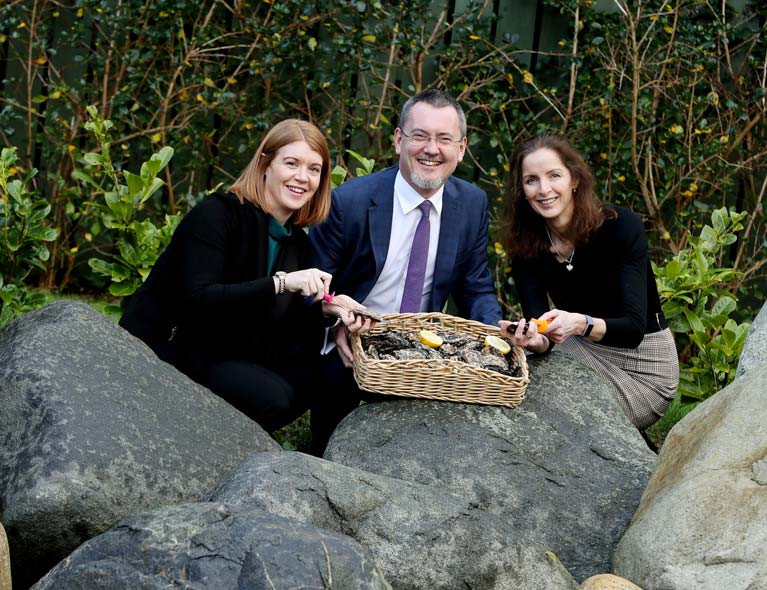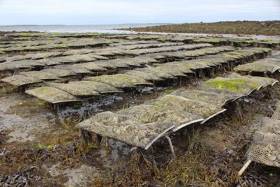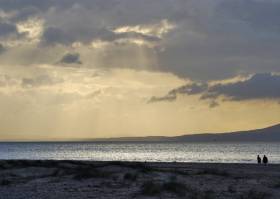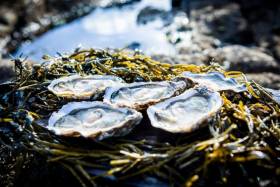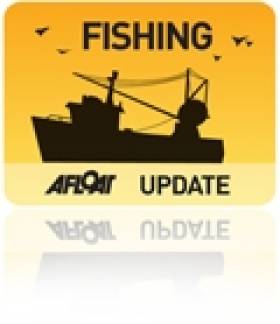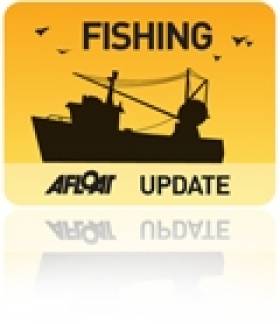Displaying items by tag: oysters
Ireland’s Oyster Producers Rise to Market Challenges
Bord Iascaigh Mhara (BIM), Ireland’s Seafood Development Agency, in association with IFA Aquaculture, is hosting a two-day seminar today (Thursday 13th February 2020) for members of Ireland’s vibrant oyster farming sector, valued at €43million according to the latest (2018) Business of Seafood report. The sold-out event, taking place in Carlingford, Co Louth, has attracted participants from more than 85% of businesses in the industry.
Speaking at the opening of the workshop, BIM’s chief executive, Jim O’Toole said, “The demand for Irish oysters continues to increase in Ireland and overseas. Consumers in Europe and Asia are actively seeking out Irish oysters and cite the unique characteristics and diversity in taste between brands. This strong and growing reputation has translated into strong prices for Irish oysters and excellence in food safety management and stringent attention to quality control among industry members accounts for much of these successes. BIM continues to support and work closely with the sector. It is a sector that has enormous potential to continue in its upwards growth trajectory and to further benefit those living and working in coastal communities throughout Ireland.”
The sector enjoyed a positive year in 2018, according to the BIM Business of Seafood report, producing an all-time high of 10,300 tonnes of oysters and employing 1,300 people nationwide. The seminar is taking place in an area renowned for its quality oyster production and will feature presentations from a host of experts on practical topics of immediate interest to the Irish sector.
Despite recent health and socio-economic challenges presented by the Asian market that have affected exports Irish oyster producers remain at the forefront of the luxury offering, with the sector showing continued investment in packaging and branding, focusing on Irish oyster’s superior quality. The latest figures show nearly 30% of Irish oysters are now packed and branded in Ireland prior to export, adding extra value to the sector. While France remains our largest export market at 74% of total export volume in 2018, we are continuing to diversify into alternative European markets such as the Netherlands and Belgium (2019 saw a 31% increase in exports to the Netherlands).
The morning session will include short ‘flash’ presentations from IFA Aquaculture on where we are as an industry, the latest BIM initiatives which aim to further promote sustainability, innovation and competitiveness in the Oyster Sector as well as some of the more innovative approaches from industry to further develop their businesses.
The second part of the morning session will look at some of the results from BIM’s Bluefish Climate Change project, funded by the Ireland Wales Programme. There will be an overview of our current trade position and opportunities for further expansion. We will also be joined by Bord Bia to highlight oyster promotional events in Europe throughout 2020 and the Food Safety Authority of Ireland to take us through some of the possible implications of Brexit in terms of food safety regulations.
Speakers from the Marine Institute, the SFPA and other industry experts will focus the afternoon session on topics such as water quality biosecurity, biotoxins and other environmental factors which significantly affect both oyster production and trade
The final aspect of the workshop will be an informed panel discussion, based on the day's presentations and addressing questions posed by workshop attendees.
Oyster Farming Industry & Researchers Meet To Discuss Latest Knowledge On Oyster Health
The latest research and knowledge on oyster diseases was presented at a meeting on Pacific oyster health held recently by the Marine Institute’s Fish Health Unit.
The event attracted more than 80 participants from Ireland’s oyster farming industry, as well as representatives from Ireland’s seafood development agency Bord Iascaigh Mhara.
Presentations focused on mortality, disease management and current national and international research in oyster health.
Oyster mortalities in recent years in Ireland have been mainly associated with either Ostreid herpes virus-1 μVar (OsHV-1 μVar) infection or the bacterium Vibrio aestuarianus. Both diseases cause significant oyster mortality events and an economic loss to oyster farmers and producers.
Researchers from the Marine Institute and University College Cork presented the major findings from the REPOSUS project, funded by the Department of Agriculture, Food and the Marine’s FIRM programme.
The three-year REPOSUS project focused on reducing the impact of pathogens associated with mortalities in Pacific oysters. This included results from sentinel trials in disease impacted bays, molecular and pathogenicity characterisation studies on isolates of OsHV-1 and rache and studies on environmental parameters which influence mortality.
French institute IFREMER also presented the latest results from the VIVALDI project (Preventing and Migrating Farmed Bivalve Diseases) funded by the EU’s Horizon 2020 research and innovation programme.
VIVALDI combines European research resources to better understand shellfish diseases and improve the sustainability and competitiveness of the European shellfish industry. The Marine Institute is one of 21 partners involved in this research project.
Industry representatives from Ireland also shared their experience of managing losses in shellfish production due to oyster disease and mortality on their sites.
This feedback, along with research presented, will be used to update the current best practice guide for disease control and management in Ireland's oyster industry.
#Oysters - Unauthorised oysters farms have exploded in number on Lough Foyle amid a continued dispute over its ownership, as the Belfast Telegraph reports.
The estuary between the counties of Donegal and Derry remains a point of contention as Brexit looms, with both the UK and Irish governments claiming dominion over its waters.
As a result, there has been a proliferation of unregulated oyster farming that could be worth £20 million or €22.89 million each year, according to the Loughs Agency.
The Belfast Telegraph has more on this story HERE.
On Tuesday 5th June 2018, a man was convicted by Judge Mary Fahy at Galway District Court for being in possession of 1,425 undersized native oysters (Ostrea edulis), contrary to Bye-Law 628 of 1982.
Patrick Cormican, with an address at Newline, Maree, County Galway, pleaded guilty to a single charge of being in possession of the undersize native oysters when apprehended by Fisheries Officers at approximately 1pm on 7th December 2017, at Blackweir, County Galway.
Solicitor Dioraí Ford, representing Inland Fisheries Ireland, outlined to the court that Fisheries Officers observed Mr. Cormican loading bags of oysters into a tractor-trailer at Blackweir on that date. The officers were aware that these bags contained undersized oysters. Mr. Cormican is a licenced oyster fisherman and on the day in question had approximately 5,000 oysters, of which 1,425 were undersized. Officers spent over an hour and a half measuring and counting the oysters.
The court heard that Mr. Cormican was co-operative on the day in question and had a previous conviction in relation to oysters dating from 1991. Judge Fahy commented on how serious a matter this was, particularly with the local connection with the world famous Clarinbrige Oyster. Mr Ford outlined that the Fisheries Officers involved in the case had never seen such an amount of undersized oysters before while carrying out an inspection of this type.
Judge Fahy convicted Mr. Cormican and imposed a fine of €750. Costs of €800 were also awarded against Mr. Cormican.
Oysters in Ireland
There are two species of oysters commonly eaten in Ireland – the native oyster (Ostrea edulis) and the non-native Pacific oyster (Crassostrea gigas). The native oyster grows wild and is typically caught by licensed dredging, while the Pacific oyster is most commonly farmed on trestles and harvested mechanically.
Native oyster stocks are under threat and sustainable fishing requires adherence to size limits, in order to allow oysters to grow large enough to breed before harvesting. The minimum legal size is 76mm. Inland Fisheries Ireland is charged with protection of oysters, and conducts regular inshore patrols to check for compliance. Sales outlets such as fishmongers and restaurants should be familiar with the legal requirements and refuse to accept undersize oysters.
Deadline Approaching For 2018 Oyster Dredge Licences
#Fishing - Fishermen wishing to apply for oyster dredge licences for the 2018 season must submit a completed official form to the relevant River Basin District Office before noon on Friday 24 November.
This process became necessary due to the fact that there are many Special Areas of Conservation (SACs) and Natura 2000 sites in Ireland that also contain oyster fisheries.
As the exploitation of these fisheries will require dredging, appropriate assessment of these fishing activities will have to be undertaken.
In the absence of appropriate assessments, against predetermined conservation objectives, it is necessary to ensure that no intensification of the fishing activity for oysters be permitted.
This has been further strengthened by the issuing of a direction from the minister in accordance with Section 278 (5)(a) of the Fisheries (Consolidation) Act 1959 as amended and the Habitats Directive as transposed by European Commission (Birds and Natural Habitats) Regulations 2011 (SI 477/ 2011).
As yet, no appropriate assessment of the potential impact of the wild oyster fishery has been completed for most locations within SACs and, in the absence of the necessary advice, Inland Fisheries Ireland must ensure that no intensification of the oyster fishery takes place.
As a consequence, IFI must continue to limit the number of licences that can be issued for 2017.
The official procedure and application form are available for download at the IFI website HERE.
Applicants must complete the application form in full and ensure that any relevant information that will assist IFI in assessing their application is submitted with the application.
The relevant licence fee for 2018 is €89 and this must also accompany the application. Unsuccessful applicants will have their fee refunded in full. Further information on the process is available with the application form.
Application forms are also available from Inland Fisheries Ireland, Teach Breac, Earl’s Island, Galway, H91 K6D2 (Tel 091 563118), from any Inland Fisheries Ireland District Office, or from Inland Fisheries Ireland head office, 3044 Lake Drive, Citywest Business Campus, Dublin 24, D24 Y265.
Applications Open For 2017 Oyster Fishing Licences
#Fishing - Fishermen wishing to apply for oyster dredging licences for the 2017 season must apply with the official form via the relevant River Basin District Office before 12 noon on Friday 25 November.
Inland Fisheries Ireland (IFI) say this process became necessary due to the many Special Areas of Conservation and Natura 2000 sites in Ireland that also contain oyster fisheries.
As the exploitation of these fisheries will requires dredging, appropriate assessment of these fishing activities will have to be undertaken.
In the absence of appropriate assessments, against predetermined conservation objectives, it is necessary to ensure that no intensification of the fishing activity for oysters be permitted.
This has been further strengthened by the issuing of a direction from the Minister for Agriculture, Food and the Marine in accordance with Section 278 (5)(a) of the Fisheries (Consolidation) Act 1959 as amended and the Habitats Directive as transposed by European Commission (Birds and Natural Habitats) Regulations 2011 (SI 477/ 2011).
For further information on the official application procedure, visit the IFI website HERE.
Carlingford Oyster Festival Opens Today
#MaritimeFestivals - The 2016 Carlingford Oyster Festival kicks off this evening (Thursday 4 August) on the shores of Carlingford Lough with the official opening of the event that runs till Monday 8 August.
This Saturday (6 August) is when the festivities really under way, with local restaurants offering samples of their finest seafood dishes.
Visitors will have an opportunity to try some of the Co Louth town's renowned local oysters at the Festival Oyster Tent.
There will also be guided tours of what's one of Ireland's few remaining Medieval walled towns, to coincide with Irish Walled Towns Day on Sunday 7 August.
Body Discovered In Search For Missing Fisherman Off Clare Coast
#Missing - RTÉ News reports that a body was found yesterday morning (Sunday 19 April) in the search for a missing fisherman off the Clare coast.
The search and rescue operation began in the early hours of yesterday morning after four people working with tractors in the oyster beds at Poulnaserry Bay got into difficulty when the tide came in.
Three of the fishermen were rescued by a local boat. RTÉ News has more on the story HERE.
Hong Kong Bans Donegal Oysters Over Food Poisoning Scare
#Seafood - Donegal's oyster industry has been hit by an import ban in Hong Kong over an outbreak of food poisoning.
According to The Irish Times, food safety investigators in the Chinese territory were notified by Irish authorities two weeks ago that the presence of norovirus was confirmed at a raw oyster processing plant in the north-eastern county that services the crucial Asian market.
Hong Kong subsequently banned the import of raw oysters from Donegal "for the sake of prudence". More HERE.
Applications For 2015 Oyster Dredge Licences
#Fishing - Fishermen wishing to apply for oyster dredge licences for the 2015 season must apply on the official form to the relevant River Basin District Office before 12 noon on Monday 17 November 2014.
Inland Fisheries Ireland (IFI) says this process became necessary due to the fact that there are many SACs and Natura 2000 sites in Ireland that also contain oyster fisheries.
As the exploitation of these fisheries will requires dredging, appropriate assessment of these fishing activities will have to be undertaken.
In the absence of appropriate assessments, against predetermined conservation objectives, it is necessary to ensure that no intensification of the fishing activity for oysters be permitted.
This has been further strengthened by the issuing of a direction from the Minister in accordance with Section 278 (5)(a) of the Fisheries (Consolidation) Act 1959 as amended and the Habitats Directive as transposed by European Commission (Birds and Natural Habitats) Regulations 2011 (SI 477/ 2011).
For further information, details on the official application procedure and the application form, visit the IFI website HERE.



























